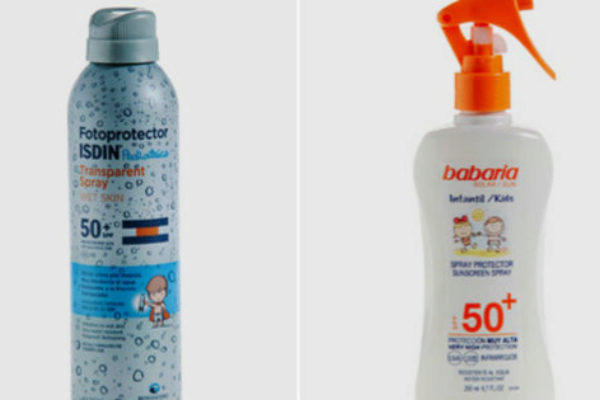- OCU. Calls for the withdrawal of two children's sun creams from Isdin and Babaria for giving less protection than they mark
- OCU study: Isdin's CEO: "Nobody has been burned. The alarm has no place"
The Spanish Agency for Medicines and Health Products (AEMPS), under the Ministry of Health, has reported that it has agreed with the companies Isdin and Babaria to withdraw the two sun creams requested by the Organization of Consumers and Users (OCU), 'Isdin Photoprotector Pediatrics Transparent Spray SPF 50+ 'and' Babaria Infantil Spray Protector SPF 50 ', for offering less protection from the bride.
Last July the agency reported the variability observed in the application of the reference method for the determination of the protection factor alone r (SPF) and the possible influence that new presentations (transparent spray or mists) could have on the test results.
Subsequently, it was reported that the difference observed between the FPS results obtained by the OCU and the two companies could not be fully justified by the variability of the method and the type of presentation. Therefore, AEMPS carried out a new analysis in a third laboratory, a member of a European group of laboratories that, among other measures, undergo interlaboratory comparisons as a means to show the reproducibility of their results.
These analyzes have offered SPF values lower than those of the labeling of the referenced products and different from the previous results confirming the variability already observed. Therefore, AEMPS has warned that the factors that could affect the variability observed in the results of the SPF tests could be, among others: the radiation doses used , the possible differences within the same skin phototype of the Volunteers participating in the trials, as well as subjectivity in what is considered erythema (redness of the skin) caused by the radiation used in the trial.
After the evaluation of all the information as a whole, as a precautionary measure and in an exercise of responsibility with the protection of the citizens' health, and in accordance with the AEMPS, the companies will proceed to voluntarily withdraw these products from the market.
Isdin has announced that its product is "completely safe" for health and that its protection value " has been endorsed by different independent studies carried out under standards established at European and worldwide level". And, at the same time, it announces that it launches a new formulation of the same product "that overcomes the discrepancies in the methodology of independent laboratory studies."
"No burn incidents have been reported"
Health has assured that "no sunburn incidents related to these products have been reported to the Spanish Cosmetovigilance System and recalled that the use of sunscreen products helps prevent skin cancer.
In this regard, the agency has recognized the collaborative attitude of companies with health authorities to avoid uncertainty in labeling and has commented that they will continue working to ensure the effectiveness of sunscreens through contact with the committee responsible for the elaboration of the ISO 24444 standard, for the determination of the SPF (which is being reviewed), with the European institutions competent in the matter and transferring them the need to have a reference method in the measure of sun protection that is reproducible for any product format and urging them to be reviewed in the shortest possible time.
At the same time, the AEMPS has advanced that a market control campaign for sunscreens has already begun in which its effectiveness studies will be reviewed, its SPF will be analyzed and it will be checked if they correspond to the SPF of the labeling
The OCU requested the removal of both sun creams following an analysis carried out by the organization in which 17 sun creams with a very high protection factor and in spray format are compared . In all the products analyzed, the protection factor announced corresponds to the real protection they offer, except those mentioned by Isdin and Babaria.
In the opinion of the organization, in the case of Isdin, the real protection factor against UVB rays is 15 -mediate- and not very high, while Babaria cream gives a high protection of 30 and not "very high ".
According to the criteria of The Trust Project
Know more- Health
Tariffs Trump's tariffs threaten Spain: 400 million in oil and 300 million in wine
International King Salman loses his bodyguard, killed in a brawl with a friend
Health "In a matter of weeks" public health will finance for the first time a drug to quit smoking

